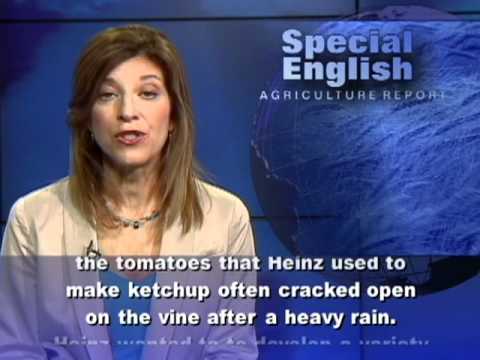This is the VOA Special English Agriculture Report, from
http://voaspecialenglish.com | http://facebook.com/voalearningenglish
Scientists have
made a genetic map of the tomato. Tomatoes are second only to potatoes as the
world's most valuable vegetable crop. Eight years of work went into making the
map, or genome. Three hundred scientists around the world took part in the
project to sequence the tomato's DNA code. Giovanni Giuliano, a researcher in
Italy, is part of the Tomato Genome Consortium. He says they started as ten
countries and now have fourteen. Having the tomato's genetic map will help
growers who are always trying to produce a better tomato. Mr. Giuliano says they
now know not only what genes are there, but their order. Researchers published
the genome of a tomato used by Heinz, the American food company famous for its
tomato ketchup. Ketchup is a thick sauce used on hamburgers, hot dogs and other
foods. Heinz's research manager, Rich Ozminkowski, says the company knows what
it wants in a tomato. "Traits like sugars and, for Heinz, viscosity, or the
juice thickness, and the redness of the tomatoes are all very critical traits
for us," he says. Those are all controlled by a lot of different genes within
the tomato. Mr. Ozminkowski says genome sequencing takes away much of the
guesswork for breeders of tomatoes or other crops that have been mapped. In his
words, "By having the genome information, we can pick out those tomato plants
that have more of those genes." Until the late nineteen sixties, the tomatoes
that Heinz used to make ketchup often cracked open on the vine after a heavy
rain. Heinz wanted to to develop a variety that would resist that cracking.
Breeders used the traditional methods of mating generations of different
varieties. The tomatoes they were trying to develop not only had to resist
cracking. They also had to resist disease. And they had to be easy to harvest
mechanically. Finally the company came up with the tomato it wanted, called the
Heinz 1706. Mr. Ozminkowski says the job would have been much easier if there
had been a genetic map to follow. There were no genetic tools at the time. But
the work today is not just about making better ketchup. Climate change may force
many crops to adjust to new conditions. And Mr. Ozminkowski says researchers are
already using the new genetic tools to help fight new plant diseases. The
researchers published the tomato genome in the journal Nature. For VOA Special
English, I'm Carolyn Presutti. For more news and information for people learning
English, go to voaspecialenglish.com.(Adapted from a radio program broadcast
05Jun2012)

원문출처 : http://www.youtube.com/watch?v=q2BHuqtlI-A&feature=youtube_gdata






 English
English 한국어
한국어
